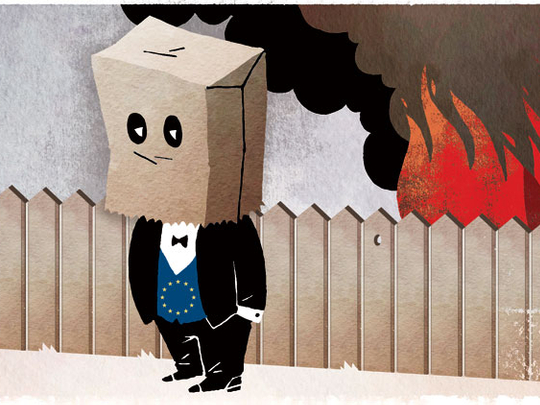
The world has entered the age of insecurity. If Europeans needed any reminder it came with the escalating violence in Ukraine. Europe is presented with a choice: It can grapple with the challenges or it can hide under the bedcovers.
The signs have not been universally encouraging. Repression in Ukraine has been met by hesitation in EU capitals. The latest moves to impose sanctions against the leadership in Kiev are overdue.
The easy conclusion to draw — I have done so myself — is one that says Europe is indeed intent on turning itself into a greater Switzerland. Its political energy is consumed by the effort to sustain the euro. The future promises slow economic growth, fiscal retrenchment and more arguments about the final shape of monetary union. As Europeans grow older, they become more risk-averse. There is neither the appetite nor money for foreign adventures.
The calculus, however, is changing. Inaction carries its own dangers. Even German politicians, long loath to raise their sights above selling more on global markets, are saying as much. Joachim Gauck, the German President, stepped out at this month’s Munich Security Conference to rebuke those of his compatriots who use history to shirk Germany’s international responsibilities.
For Europeans, the big geopolitical fact of the coming decade is US disengagement. America’s departure is as much psychological as physical. The retreat from Afghanistan, the “pivot to Asia” and the refusal to get involved in Syria speak of a US intent on shortening its horizons. US administrations are set to apply a much tougher national interest test before intervening abroad. Europe will have to tend its own backyard.
This neighbourhood is bigger than often assumed. Not long ago, the European Union (EU) defined its near-abroad as the former communist states to the east and the Arab states of the southern Mediterranean. Now it is feeling the impact of disorder in regions well beyond those boundaries.
The point is well made in a report published by FRIDE, the foreign policy think-tank in Madrid. The dynamics of relationships in the near and less-near neighbourhoods and powerful transmission mechanisms for insecurity and disorder, demand a more expansive definition. The north African desert was once a barrier; the advent of Toyota Land Cruisers and GPS navigation have turned it into a highway. You cannot make sense of the Maghreb without reference to the Sahel or of Europe’s ties to the Arab world without more than a nod to Iran. Relations with Russia cannot ignore the Caucasus.
For some, such complexities are cause to crawl deeper beneath the bedcovers. But the choice is a false one. EU states are critically dependent on imported energy. By FRIDE’s calculation, the wider neighbourhood holds 60 per cent of the world’s proven oil reserves and 80 per cent of its gas. Nor can Europe escape the costs of uncontrolled migration, jihadist terrorism and international crime. Pedro Solbes, the former Spanish minister and EU commissioner who now heads FRIDE, puts it succinctly: “There is no long-term security and prosperity for Europe if it is surrounded by conflict, human suffering and illiberal regimes.”
The are some things Europe cannot do. It can offer support and encouragement for political reform in Ukraine, but cannot overthrow the Russian-sponsored kleptocracy. Without US engagement it cannot tilt the military balance in Syria. Anything beyond short, sharp military operations demands American logistics, intelligence and targeting.
The fact that Europe cannot do everything should not be taken to mean inaction is the natural order. For all its travails, Europe remains the world’s second-richest region. It can deploy powerful economic, trade, financial and diplomatic muscle and serious military capabilities.
There are opportunities to be seized as well as risks to be countered. Africa is often viewed as a continent of failed or fragile states. Another perspective sees a cluster of young, resource-rich nations that, with some help, could soon be chasing other emerging economies.
Put another way, Africa is a vast, potentially booming market on Europe’s doorstep. What some of its governments need is what Europe has to offer: Trade and investment, financial services, governance and institution-building, and, sometimes, relatively modest military support or expertise and training.
The absence of consensus among governments jealously guarding national interests and sovereignty have hollowed out the EU’s so-called strategic partnerships with Moscow and Beijing. In places such as Africa, however, Europe can mobilise smaller coalitions of the willing to support struggling governments and regional organisations.
This is already happening in Mali and the Central African Republic. France and the UK are obvious leaders, but states as diverse as Belgium, Poland and Estonia are also willing to shoulder responsibility. Following Gauck’s admonition, last week, Berlin signed up to a new Franco-German commitment to expand foreign policy cooperation.
Europe already has some success stories, whether in building a pathway towards serious nuclear negotiations with Iran, stabilising the Balkans or combating piracy off the Horn of Africa. It lacks the heft for big military operations, but can serve as a vital agent of stability. And perhaps — sometimes we should be optimistic — it has realised that closing your eyes does not make the world go away.
Financial Times










